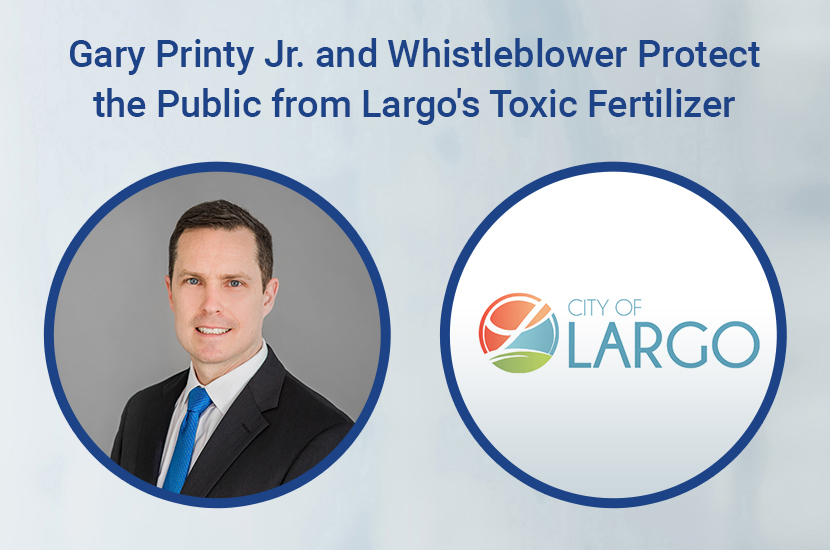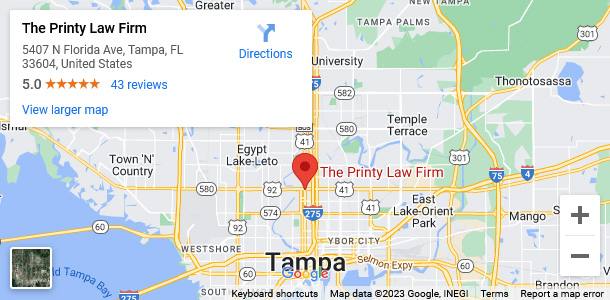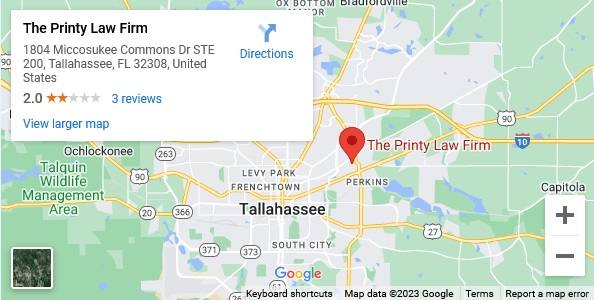Background
Month after month, in the Fall of 2021, Richard Mushaben saw the same pattern, bio- solid waste with alarmingly high cadmium levels being sold by the City of Largo to local fertilizer companies. Time and again he voiced his concerns, but his supervisor ignored him and even told him to stop monitoring the cadmium levels. He knew he had to report it to someone to protect the public, but he didn’t want to risk getting fired. He also didn’t know who he should report the violations to or even how to do it.
From March 2020 to December 2021, the City of Largo sold cadmium-contaminated fertilizer that violated the acceptable federal levels. The federal government’s ceiling concentration for cadmium is 85 parts per million. This threshold was implemented to protect and promote public health and safety. Studies have shown that cadmium exposure can lead to kidney disease, fragile bones, and even cancer among those exposed to it for a prolonged period of time. In November 2021, Largo’s cadmium levels were dangerously high as it surpassed the acceptable federal standards by 229%. To make matters worse, Largo illegally misrepresented its fertilizer products as class AA fertilizer, so that it could be spread on golf courses, lawns, parks, and other places where it may come into contact with people.
Richard Mushaben was a biosolids operator at Largo’s wastewater reclamation center facility. Mr. Mushaben helped treat human sewage and convert it into fertilizer, which was then sold to private companies. Mr. Mushaben witnessed the ongoing sale of cadmium-contaminated fertilizer and tried to prevent its sale. When Mr. Mushaben attempted to complain about the contamination to his superiors, he was told to stop monitoring cadmium levels in the outgoing product.
This is when Mr. Mushaben came to the Printy Law Firm for counsel. We listened to his concerns and advised him on the best course of action. We drafted a whistleblower letter to state and federal environmental regulators to advise them of his observations and concerns. In response, regulators from the Environmental Protection Agency (EPA) investigated the matter and found that Largo had illegally sold more than 1,000 tons of contaminated fertilizer. Now, Largo faces more than $100,000 in fines. In a recent interview with the Tampa Bay Times, Mr. Mushaben stated, “We all have a responsibility for public safety and health.” In the article, Attorney Gary Printy, Jr. stressed the importance of protecting insiders who are reporting these kinds of illegal activity.
If you find yourself in a similar situation to Mr. Mushaben, contact an attorney to help you better understand whether you have a whistleblower case.
Whistleblower Retaliation
A “whistleblower” is a term used to describe an employee who reports employer wrongdoing directly to the employer, a governmental agency, or a law-enforcement agency. Whistleblower retaliation occurs when an employer takes adverse employment action against an employee who has complained about a violation of law or regulation. Employers may take adverse employment action against employees in the following ways:
- Demotion;
- Non-Promotion
- Reduction of hours;
- Reduction of pay;
- Harassment;
- Negative Evaluations; or
- Termination
Federal law prohibits an employer from engaging in adverse employment against an employee for exercising their rights under the U.S. Department of Labor’s whistleblower protection laws
(i.e. OSHA). In Florida, public and private employees are both protected from whistleblower retaliation.
Whistleblower Protections
The U.S. Department of Labor protects employees facing retaliatory action from their employers. To retain whistleblower status, an employee must meet specific eligibility requirements under specific laws. Your employment law attorney can offer you guidance as to which of these laws best applies to your case.
Employees are protected from retaliation for reporting issues related to the following matters:
- Discrimination;
- Employee Safety;
- Consumer Product and Food Safety;
- Environmental Protection;
- Fraud and Financial Issues;
- Minimum Wage; and
- Overtime Pay
Some employees allow the threat of adverse employment action deter them from making a complaint regarding employer wrongdoing. It is important to remember that employees who make such complaints enjoy the protection of whistleblower retaliation laws mandated by federal and state law.
How to Prove Whistleblower Retaliation
Sometimes employer retaliation can be difficult to prove. Usually, you will need to show that your complaint directly caused your employer to take adverse employment action against you. Here is a list of documents you should gather to help your attorney prove your case for whistleblower retaliation:
- Texts, emails, or any other communications between you and your employer while you were employed with your employer;
- Any self-made documents outlining a pattern of retaliatory behavior (include such instances, date of the behavior, and negative impact of the behavior);
- Any witness statements that you think your employer has recorded that would be favorable to your case;
- Contact information of witnesses who saw the event you complained about or witnessed your employer engaging in adverse employment action against you.
If you believe that you may have a whistleblower retaliation claim, please do not hesitate to contact Printy Law Firm.





